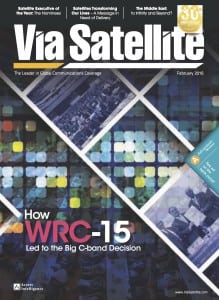Latest News
[Via Satellite 01-25-2016] Our second issue of Via Satellite Magazine in 2016 is fresh off the digital printing press, so to speak. In the February edition, we take a detailed look at the inner workings of the 2015 World Radiocommunications Conference (WRC-15), specifically at the factors that forged the great C-band compromise. We also delve into the Middle East space industry, scoping the UAE’s ambitions from OTT to Mars.
With the SATELLITE 2016 Conference and Exhibition around the corner, the time is also nigh for the announcement of the Satellite Executive of the Year award. In the February issue, we provide a roundup of the finalists, of which only one will be deemed the winner in our March issue. These articles and more can all be found in the February 2016 edition of Via Satellite, which you can read here. As a preview, we bring you our selection of the top 10 quotes from this issue.
1. “The results of this conference are very well balanced for all parties. They offer significant additional spectrum for IMT in a globally harmonized way while maintaining certainty for the current satellite allocations. This protects current and future investments in satellite systems. Reciprocally, satellite services have received new allocations that provide significant growth potential for the future, while protecting the operation and development of terrestrial services.” — Francois Rancy, director of the ITU Radiocommunication Bureau
2. “Approximately 60 nations own and operate at least one satellite. Today, space capabilities are crucial for a range of defense and security activities including responding to humanitarian relief after natural disasters in addition to times of war. Therefore, every nation needs to develop a suitable strategy to safeguard its interests in space and its space-borne assets.”— Mohamed Al Ahbabi, director general of the UAE Space Agency
3. “When I first heard about Qatar’s ambitions regarding the space industry, I thought, ‘this is a dream coming true.’” — Jaber Saeed Bawazir, scholarship student at Es’hailSat
4. “Global harmonization will bring the benefits of economies of scale, including lowering cost and accelerating deployment, as countries start to assign the spectrum for mobile use. We were also pleased that some countries in Region 2 identified 3.6 to 3.7 GHz for IMT, which opens the doors for others to join when the time is right for them.” — Veena Rawat, senior spectrum advisor at GSMA
5. “We are not happy about the loss of this portion of the C-band, which many satellite operators still do make good use of and, more importantly, users rely on, but in terms of a compromise this was as good as it was going to get,” — Aarti Holla Maini, secretary general at ESOA
6. “I was convinced that the future of Qatar is in hydrocarbons like oil and gas and nothing else, but then I did my research and found that there is a movement to change the future of the country and the long term aim is to be completely dependent on resources other than gas and oil,” — Mubarak Jumah Abdulla, scholarship student at Es’hailSat
7. “The UAE seeks to develop a long-term strategic plan for a solid and sustainable foundation for advanced space innovation and exploration, all of which is expected to aid the growth of science and a knowledge-based economy.” — Mohamed Al Ahbabi, director general of the UAE Space Agency
8. “With the most recent WRC decisions finalized, our industry has already begun reaching out to IMT interests to redouble our focus on the strong synergies that exist between wireless and satellite technologies,” — Dave Hartshorn, secretary general of the Global VSAT Forum (GVF) and chairman of the Satellite Spectrum Initiative (SSI)
9. “As infrastructure across the region continues to improve, there will be growth in [Over-the-Top] OTT delivery opportunities, but I’m not sure I see that at the expense of satellite distribution,” — Mark Billinge, chief technology officer at OSN
10. “In such a competitive landscape, it’s always important to have the right partners. We are building ties with companies and educational institutions to put transfer of knowledge programs in place so that we build specialized manpower while simultaneously developing existing cadres.” — Salem Al Marri, assistant director general for scientific and technical affairs at Mohammed Bin Rashid Space Centre (MBRSC)
Get the latest Via Satellite news!
Subscribe Now